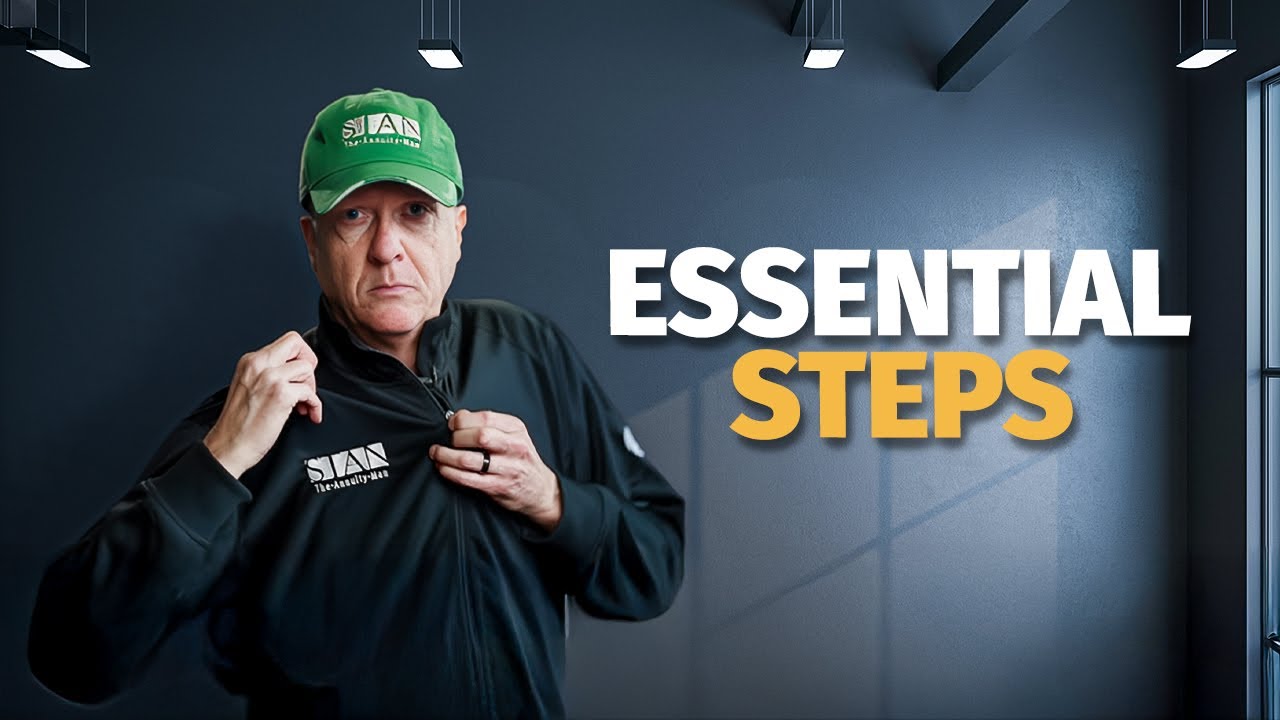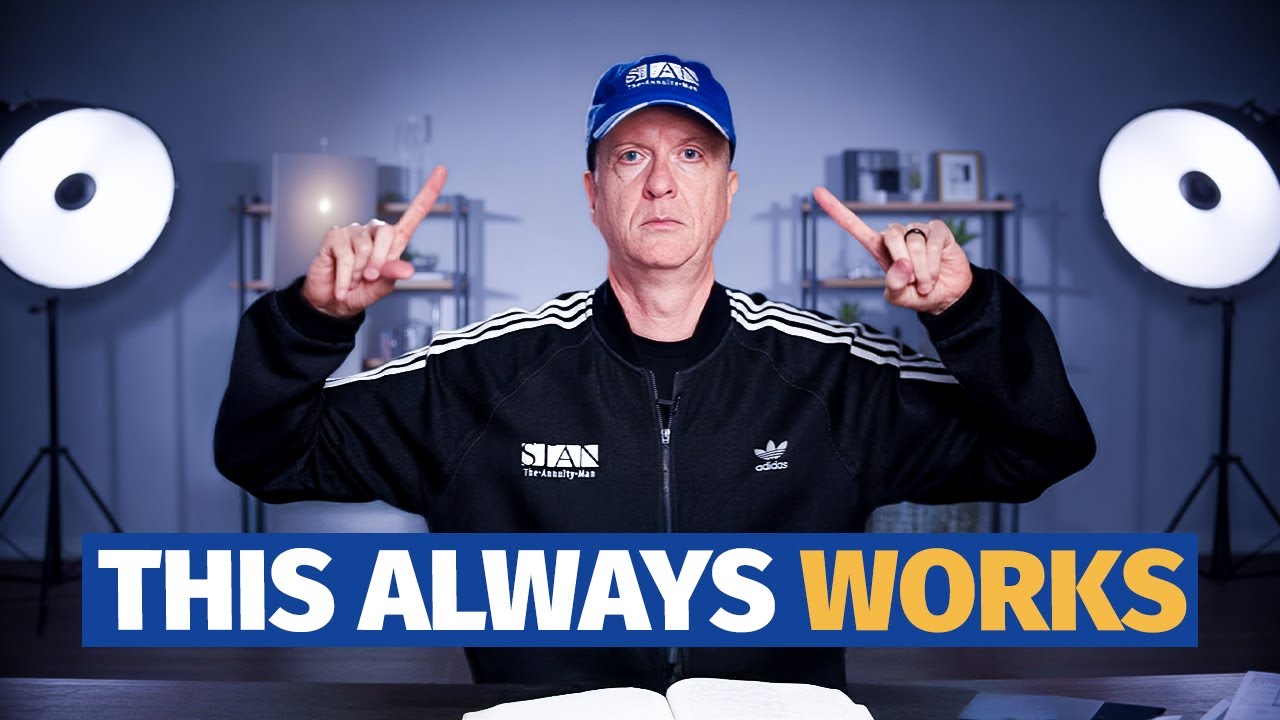Table of Contents
Top 10 Things I’ve Learned About Retirement Planning

Your Retirement Planning Guide
These are the top things I've learned about retirement planning in this past year. There are more than 10, but this is the top 10, and we're going to go over each one in detail.
Number 10
You need a rational plan to address inflation. Yes, inflation is here. I don't think it's going away, and you need to look at inflation from the standpoint of how it affects you, if you need more income, and how are you going to create that for your income flow. My advice is to go to my retirement calculators and get a reverse engineered quote solving for the monthly income amount you need to address inflation.
Number 9
Income flooring is a must. You have to have an income floor in place. What's an income floor? It starts with social security, the best inflation annuity on the planet. The income floor is the monthly amount hitting your bank account every month that you can never outlive as long as you are breathing. How do annuities fit? You can have an annuity set up for income to start immediately or in the future.
Number 8
Life expectancy and mortality credits drive the income pricing train. When looking at lifetime income using either SPIAs, DIA, QLACs, or income riders, remember that interest rates play a secondary role. Life expectancy and when you’re taking the payment is the determining factor from a pricing standpoint; the older you are, the higher the payment.
Number 7
If your spouse is still king or queen. What do I mean by that? You need to plan for your demise. You need to plan to ensure that they are taken care of, whether that's life insurance or a lifetime income plan for them, or lifetime income joint life on you and your spouse. You need to make sure that benefit, that lifetime income stream will continue uninterrupted and unchanged for your spouse, period.
The bottom line is that one out of one of us is going to die.
Number 6
That could be the best motivational piece I've ever come up with, but I didn't come up with it; my friend Bill Black did. Bill Black is arguably the top life insurance agent in the country; he’s been on my podcast Fun with Annuities®, which comes out every Tuesday if you’re interested. One out of one of us will die; it will happen. I'm like, "Man, you're such a motivator." but he's right. You need to plan for your eventual demise when your Learjet hits the mountain, when your Lamborghini hits the tree, when Bentley flips over, when it's over, when you're toast, when you're in the ground the worms are eating you. Motivation enough?
You need to think like that because you need to put together a plan, a legacy plan, whether it's using annuities or life insurance so that your loved ones are fully taken care of, whether that's a lump-sum that's coming to you upon your death with life insurance tax-free and probate free, or setting up a lifetime income stream for your spouse or family members so that they can never outlive that income. They have a pension income in place for them. One out of one of us is going to die.
Number 5
The four percent rule, is dead from my friend Wade Pfau, who was just on my Fun with Annuities podcast. This is a big one because everyone is set up until this point. You just have a mixed portfolio; I don't care about stocks and bonds; you just fill out four percent, and you'll be fine. Wade Pfau shot that down. He pulled out a shotgun and shot it down factually because what he saw were people who were just looking at North American markets and not factoring in any type of overseas markets. We are in an international type connected world, and I felt that was a fantastic moment that he pointed out and he just wrote a book on it, that the four percent rule is dead.
If you're agent, adviser, master of the universe, stockbroker, whoever that person is, who will use the four percent rule? That's like saying that I will use a ham radio instead of the Internet. That's dumb. The four percent rule is dead; you cannot look at that from creating income off of your portfolio. If you're going to look at a percentage rule, it has to be a smaller percentage, and as Wade says, you might want to pepper that in with some guaranteed lifetime income annuities. That's not a sales pitch; that’s Wade Pfau saying that he didn't sell annuities, he writes books, he does research, he looks at facts, and the fact is you need to have a transfer risk lifetime income component in addition to the annuity that you already own called Social Security to provide that lifetime income that you can never outlive as long as you are breathing.
Number 4
From my friend Tom Hegna, who was also on my Fun with Annuities podcast, talked about mortality credits being the key and the secret sauce to lifetime income. According to Tom, it’s all about life expectancy, and he is right. It's not interest rates. You’re looking at its life expectancy, and most of us will live longer than we project to live. Thomas is a big proponent of looking at those mortality credits and you can go to TomHegna.com and see what he's talking about mortality credits driving the pricing train. With that being said, you have to shop all carriers for the highest contractual guaranteed lifetime income for your specific situation and have all carriers bid on that, so you know that you're going to lock in that highest contractual guarantee.
We’re getting down to the wire here.
Number 3
Current interest rates might be the new normal. We have to be realistic. With the government printing so much money to raise interest rates, they're raising interest rates on themselves, so I'm not sure it will happen at the rate you want it to happen; I’ve got my fingers crossed. I want interest rates to rise, that would be fantastic, but we can't cavalierly say, well, interest rates have to go up, no, they don't. They could go lower; they could go to zero; they could go negative. Don't believe that? Look at Japan; look at other European countries that it went to either zero or negative; it could happen. Will it happen? I hope not. Could it happen? Maybe it could. You need to prepare for either interest rates staying at this level because it could be the new normal. It's been the new normal for a long time. Hopefully, they go up, but they could go lower. You have to have a plan for that.
Number 2
Once again, one of my podcast celebrity guest hosts was fantastic, and this hit me like a sledgehammer; his name is Jamie Hopkins; he’s a very smart guy. He said there has to be things in your retirement plan, which makes you cry. Now, what is that? That could be setting things up for your spouse so that they're taken care of when you die, setting things up contractually for your kids, or giving money away to a charity that means a lot to you that is emotional to you. Financial planning, retirement income planning, retirement planning isn't all about numbers and contractual guarantees. Even though I preach buy the highest contractual guarantee, it's not all math. You have to base it on the highest contractual guarantee to make the decision. You own a new annuity for what it will do, not what it might do®.
But the way that makes you cry is something that you need, and that's personal to you that you need to realize, why are you doing this? Why is the plan in place? Why are you meeting with your tax lawyer? Why are you meeting with your state planning lawyer? What is the why that makes you cry? What's important to you? Everybody has something different, but everybody has something emotional to them, that's important to them, that's the reason that they're doing the retirement planning, is the reason that they work hard and do the research and watch videos like this, is the reason that they're always looking at the end of the year and say, what can I do to make it better?
You've worked hard; you’ve scraped, you've saved, you've done without, you've put away money, you've planned, you've made it, you're successful. Congratulations. The math has worked for you. What do they say? Compound interest is the eighth wonder of the world. However, I want you to think about the why that makes you cry? Why are you doing this? Focus on that, make the plan revolve around that, and I think your financial plan, it'll be more enjoyable to do this because there is a goal there that's personal to you.
Number 1
Finally, there's no u-Hauls behind hearses, and if you see one, take a picture and send it to me. What does that mean? That's me being from the south. I'm from rural America. I'm from the rural Carolinas. But when I say there are no u-Hauls behind hearses, COVID has been horrific to watch, but it's made us realize the fragility of life. Hopefully it’s made us realize to take advantage of the day, maximize the day, appreciate things, look at your family and friends, and appreciate them. There are no u-Hauls behind hearses; you can't take it with you. I want you to enjoy your retirement, I want you to enjoy planning for your retirement if you haven't retired yet, but I want you to plan to live your life. I want Chapter 2 to be fantastic. I want you to check off those boxes; I want you to get that bucket list out because there are no u-Hauls behind hearses.
I encourage every client of mine to do that because I have clients every year that call me and say I wish I would have done that, Stan. I wish I had gone out on that trip; I wish I had bought that; I wish I would have done this for my loved ones. I'd give $10 million to feel better; I had one guy tell me if you can believe that, and he would've. Don't let that be you. There are no u-Hauls behind hearses.
Those are the ten things that I learned. I hope that they can impact you, make you be a better planner, and make you enjoy life more because annuities are transfer risk products at the end of the day. I want you to live your life by transferring that risk, have those contractual guarantees in place so that you could care less if there are u-Hauls behind hearses because you're living your life.
Never forget to live in reality, not the dream, with annuities and contractual guarantees! You can use our calculators, get all six of my books for free, and most importantly book a call with me so we can discuss what works best for your specific situation.
.png)
.svg)






































.jpg)

.jpg)
.jpg)
.jpg)
.jpg)

.jpg)


.jpg)
.jpg)
.jpg)
.jpg)
.jpg)


.jpg)
.jpg)

.jpg)


.jpg)

.jpg)


.jpg)
.jpg)
.jpg)

.jpg)

.jpg)
.jpg)



.jpg)






.jpg)
.jpg)

.jpg)


.jpg)
.jpg)
.jpg)
.jpg)
.jpg)
.jpg)
.jpg)
.jpg)
.jpg)
.jpg)
.jpg)
.jpg)
.jpg)
.jpg)